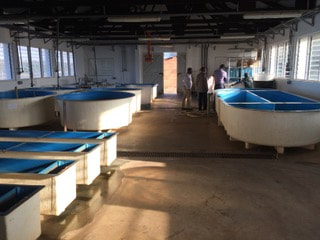 Aquaculture facilities are state of the art and welcome collaborations on the use of insects as feed. Aquaculture facilities are state of the art and welcome collaborations on the use of insects as feed. In recent years, amazing progress has been made advocating insects as new sources of protein to mediate the global food shortage and improve diet nutrition. Much of this progress is directed toward creating new economies in industrial nations in efforts assess the potential for adding value in food production chains using insects, and creating optimized methods for wide-spread acceptance and use. Progress is also needed on a global scale, especially in the developing world where malnutrition affects much of the local populations. The black soldier fly (BSF) system offers a remarkable opportunity as a reliable, sustainable protein source that is the result of organic matter recycling and conversion. There is a need for insect production systems development in communities of developing nations, from villages to large urban centers, most impacted by food insecurity in Sub-Saharan Africa. The BSF system can create new revenue streams that meet the demands of the local and regional economies, from small villages of less than 100 people to larger cities with large produce markets. Farming BSF for feed in developing nations will require developing partnerships that bring together experts in entomology, food nutrition, food production and human health. To begin to address this need in Malawi, we have developed a transcontinental partnership between Michigan State University (MSU) and two Universities in Malawi, Africa: Lilongwe University of Agriculture and Natural Resources (LUANAR),and the College of Medicine at the University of Malawi.The tentative name for our partnership is the Global Alliance for Insect Farming in Africa(GAIFA). A key goal of this alliance, initially funded by the MSU Alliance for African Partnership initiative, is tobring together experts, professionals, local stakeholders, and organizations from Africa and MSU to work toward a common goal of achieving farming insects for feed. We envision that developing a network of partnerships between researchers and local members of the community will improve sustainable food security in Malawias an initial example, but also in many other Sub-Saharan countries with critical nutritional needs. The objectives of our partnership are to: 1) identify local stakeholders that would potentially implement the use of insects as a novel feedstock for livestock, such as aquaculture and poultry; and 2) identify insect species and their food sources, such as market waste, to be targeted in future research. These data collection efforts will then be used for funding applications in which the end goal would be to optimize insects and their associated microbiomes to improve nutrition in a manner that will benefit local communities. Thus, the resulting research will improve African livelihoods by increasing the amount of available protein for consumption through improved livestock, and will enhance livelihood security of individuals through community-level actions, creating new revenue streams and enabling women and children in the process. By accomplishing these goals, our partnership intends to develop the important capacity to enable local individuals to create new revenue streams that directly improve the local nutritional needs of villages, hamlets and sub-urban populations. Indeed, by converting local waste into new sources of animal feed, the BSF system (and other insect systems) has the potential to create new revenue opportunities, especially for women and children that could have village to regional level impact towards improving human health and development. Our partnership is continuously evolving and we look forward to meeting and interacting with new collaborators (like EVO Conversion Systems) at the individual, group and institutional levels. Please contact any of us at or respective email addresses if you have interest in joining us in developing insects for food, feed and health in Africa. AuthorDr. M. Eric Benbow
2 Comments
Jack
11/13/2018 01:12:42 am
I'm interested to know what makes this a "Global Alliance" and not just a partnership as is the case in many scenarios where Universities collaborate. South Africa should be promoting this trade up Africa as they are recognised as industry leaders; maybe this will come with time.
Reply
Leave a Reply. |
AuthorIndividuals with over 25 years research experience with the black soldier fly. We are passionate about the science behind the black soldier fly and its ability to convert waste to protein. Get Notified Here
Archives
September 2022
Categories
All
Install an RSS app to get notified from us when a new post is up!
|
ServicesSupport |
About |

 RSS Feed
RSS Feed

